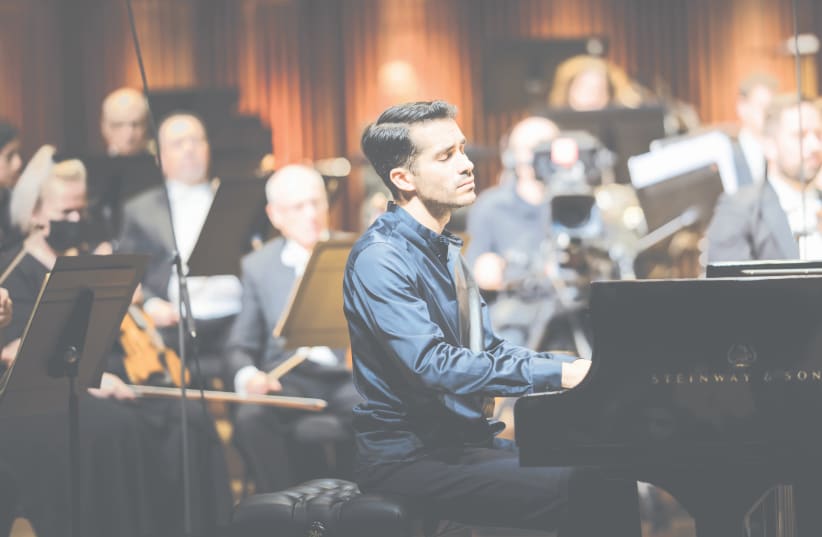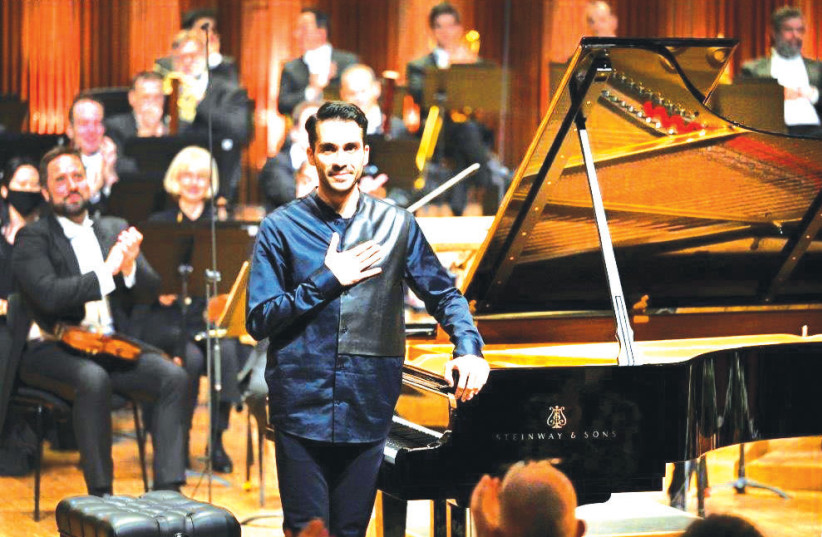Spanish pianist Juan Perez Floristan, winner of the 2021 Arthur Rubinstein Piano Competition, will be the grand guest of the Israel Philharmonic Orchestra for a week of performances next week.
Over the course of eight concerts (March 18-26) in Tel Aviv, Jerusalem and Haifa, Floristan will perform the virtuosic “Rhapsody on a Theme by Paganini for Piano and Orchestra,” by Rachmaninoff. IPO music director Lahav Shani and the orchestra will perform Petrushka by Stravinsky, The Scythian Suite by Prokofiev, and give the first IPO performance of “Therefore Choose Life” by Russian/Israeli composer Boris Pigovat.
Floristan will be involved in rehearsals and performances with the IPO, in addition to attending and performing at the Arthur Rubinstein Piano Competition, which opens on March 14 in Tel Aviv.
Floristan said he considers the Rubinstein award, as well as winning the Paloma O’Shea International Piano Competition in Santander, Spain, as two of the greatest milestones to date in his career.
How are these two competitions the same and yet different?
“They were the pivotal points in my career for obvious reasons: I started playing more and more, and began traveling quite a bit. But they were different from a personal point of view. The Paloma Santander competition is the most important competition in Spain and one of the top ones in Europe. Therefore, I had a profound emotional attachment to it. I felt like winning was something important for my home.
“The Rubinstein competition had a much larger scope and exposed me to a truly international scene. It was more intense and, in some ways, more rewarding. It was the confirmation of my work, and meant I was doing it ‘right,” at least for a moment.
“The true competition comes (inside oneself) afterward, not only being able to do it ‘right’ in the long term, but also knowing what is right and what is wrong. Not an easy task.”
Floristan’s journey on a musical career began much earlier. At age seven, he began studying piano with his mother, the pianist and educator Maria, and learned about how music is put together from his father, conductor, Juan Luis.
Do you think the impetus and inspiration to become a musician came from the early training, and overall atmosphere of music that your parents created in the home?
“Yes, indeed. Being raised in a musical environment surely helps in developing certain skills. But I would say that the most important things you inherit from an artistic family are not so much musical abilities, but rather certain life values: a sense of what is working and what is not; a refined ear, curiosity and a desire to always discover new things.
“Nevertheless, there is one thing that cannot be taught, which is the willingness to do this. If a child does not want to play piano, nobody should force him or her to do so.”
FLORISTAN CONTINUED his studies in Madrid and his first teachers were Russian.
How did they influence your style, sensitivity and technique, and how has your playing evolved under the guidance of your later teachers and mentors?
“In the 21st century, little by little, the sheer diversity and variety of music schools is diminishing thanks to (or by fault of) globalization. I wish one could hear different sounds nowadays, but that is no longer the case, except in some rare exceptions.
“So, being in touch with some of the older generations who were not only part of the ‘Russian’ school, but of the ‘Soviet’ school (and who, in many instances, were part of the bigger ‘Jewish’ music school, which would later spread to the US as well), gave a great opportunity to look into the past.
“With time, and being in touch with different approaches, such as my beloved piano teacher, Eldar Nebolsin, to whom I owe so much; Hungarian teachers, like Ferenc Rados; and some German ones, like Eberhardt Feltz, I think I only preserved from that ‘old school’ what was of interest to me and discarded most of it.
“I guess this is what is normal in life, right? Look for your own path, with the guidance of older generations.”
In the past, you have pointed out the importance of “on stage” experience for a young musician. Can you elaborate?
Performing is a thing by itself. Whoever goes on stage, or gives a lecture, or officiates a mass, or takes part in any type of ritual, is performing. And that’s something that has little to do with playing fast scales or learning a Rachmaninoff Piano Concerto by heart. One has to develop these kinds of on-stage experiences intensively; get used to the energy of the audience; the connection that is created in the moment.
This is something that cannot be learned through online lessons and YouTube tutorials. As an artist, you need this kind of direct and live feedback, which only an audience can provide. Unfortunately, this is rarely taught at music schools. Now, I myself teach it to many, many musicians in Spain.”
In 2021, at the age of 27, you returned to Seville during the pandemic and took up actor training. How has that influenced your music?
“A ton. Acting training has enabled me to reach out and teach about achieving a stage presence, preventing stage fright, performing, body language, removing inhibitions and more. All these techniques are practiced through acting and without one’s instruments.
“It is a very liberating experience, which allows me to investigate further into my job and at the same time disconnect from it. Suddenly, going on stage as an actor, without an instrument or any music to protect you, is quite shocking – but thrilling and exciting as well. I recommend acting training to anyone and everyone, not only musicians and artists.”
You will have a great deal of “on-stage” experience, with eight concerts you are performing with the IPO and Shani. What are the techniques you will employ to keep the Rhapsody on a Theme of Paganini, by Rachmaninoff, fresh and exciting?
“This is the big question performers face, whether they are musicians, actors, dancers or anything else: how to stay fresh and enticing without losing the curiosity. I think [mastering this] is a true technique to be learned and a sign of professionalism. The artist always must find something interesting in what he is doing (and communicating) no matter the number of times he has done it.
“But, of course, this skill has a limit, and once you start performing the same piece 10 times per month, it does not matter how great of an artist you are, [the tendency] is to start engaging in autopilot. To overcome this, one must look for sources of inspiration in the score, as well as outside the context of music.”













